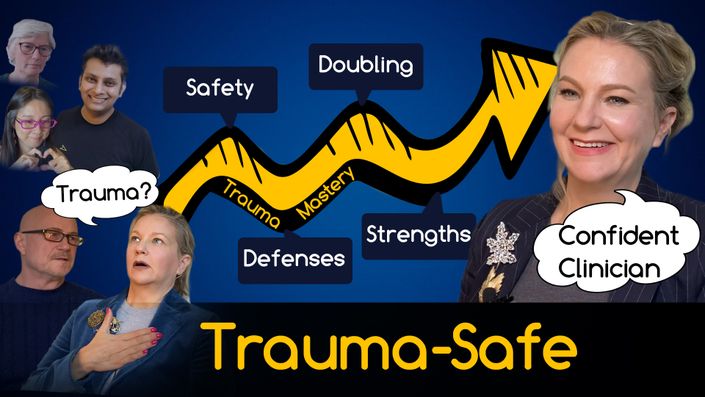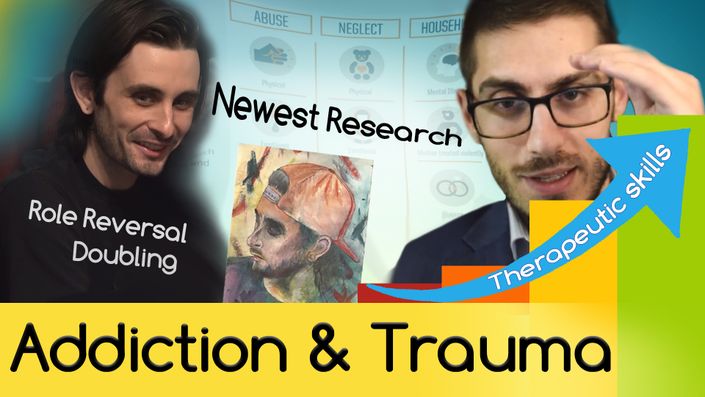
Therapeutic Spiral Model (TSM) Psychodrama: Theory & Practice with Trauma. How the Therapeutic Spiral Model Works? Foundations and Expansions.
Module 7. Making Friends with Defenses with Sylvia Israel.
Acquaint yourself with psychological defenses and employ TSM to address these defenses in your client interactions. Receive guidance from the esteemed expert, Sylvia Israel.
$40 (1 Module) - 100 days access
Countries of resedence are grouped into pricing Bands A–D, offering 30–70% discounts, applied to all modules and courses. Find your band here.
About the Course:
This video course introduces Innovative Clinical Psychodrama as an effective and safe method for treating trauma and PTSD. Recent research in the neurobiology of trauma and attachment underscores the efficacy of experiential, body-based approaches in psychotherapy and education. Clinicians working with trauma aim to establish a secure and contained therapeutic environment. Action therapy plays a pivotal role but can sometimes trigger unprocessed trauma material, leading to flashbacks and decompensation. TSM, developed by Board Certified Psychodrama Trainers, Educators, and Practitioners Kate Hudgins, Ph.D., and Francesca Toscani, M.Ed., TEP, serves as a guide for trauma treatment. TSM integrates classical psychodrama, attachment theory, and insights from interpersonal neurobiology and trauma theory, enhancing safety and structure when working with trauma.
This video module delineates post-traumatic psychological defenses, encompassing survival mechanisms, obsessions, compulsions, addictions, and eating disorders. It elucidates the process of identifying and converting these personal defenses into adaptive coping skills. The content provides valuable insights into containing defenses and facilitating the transformation of clients. Additionally, it introduces TSM prescriptive role known as the Manager of Defenses. Engage in a transformative small group session with a counselor and business consultant from the U.S., led by the esteemed expert, Sylvia Israel.
This module is designed for:
• Therapists
• Social workers
• Psychologists
• Counselors (including substance use counselors)
• Psychodramatists
• Educators
• Coaches
Appropriate for those who are new to action methods, as well as experienced practitioners, students in mental health fields, and those who want to develop their skills in action methods. Acting skills are not necessary.
Learning Objectives:
• Identify defenses and demonstrate how to direct the TSM Action Intervention of the Manager of Defenses
Module highlights:
• Warm Up: Acquire the director’s skills to contain defenses
• Action: Guide clients who've used defenses to survive trauma in building adaptive support systems.
• Sharing: Discover that action methods help your clients to express long-hidden talents, feelings, and dreams.
• Insights: Recognize and label frequently utilized personal defenses, and ability to transform them into higher-order coping skills.
How and where to use:
• Issues/concerns: trauma work, ptsd, cptsd
• In Clinical and non-clinical setting
• Individual and group setting
• Online and in-person (therapy, counseling, classes, group leading)
• Education and Coaching
This model provides a secure and effective approach for various objectives, including class management, fostering group cohesion, supporting group development, facilitating organizational development, and addressing business-related tasks.
Presenter:
Sylvia Israel LMFT, TEP, RDT/BCT, Founder/Director of Imagine! Center for Creativity and Healing and Founder/past Director of the Bay Area Playback Theatre. In addition, Sylvia is Adjunct Faculty at the CIIS and Kansas State University and has taught at various universities including Sonoma State, Dominican, and John F. Kennedy. She is a Certified Trainer in the TSM for working with Trauma Survivors and is trained in Somatic Attachment Therapy and IMAGO couples counseling. Sylvia is past-President of NADT and a Fellow of the ASGPP.
Module Includes:
Main Content:
• Videos - 50 min
• Handouts - 13 min
• Test - 30 min
• Course Survey - 5 min
Recommended Content:
• Healing Trauma with the Therapeutic Spiral Mode. Interview with Dr. Hudgins. Part 1
• Healing Trauma with the Therapeutic Spiral Mode. Interview with Dr. Hudgins. Part 2
• Healing Trauma with the Therapeutic Spiral Mode. Interview with Dr. Hudgins. Part 3
• Practicum - 30 min
Hours for Certificate:
• 2 training hours on the Action Explorations Education Certificate. Our courses may be applied toward professional certification/training hours, depending on your board’s policies. Please verify eligibility with your certifying board or primary trainer. We’re happy to connect and answer questions about course content, hours, and documentation. Reach out anytime with your questions.
Module Curriculum
Recommended Videos Not Included in Total Hours for Certificate
- Putting Down Your Defense for Today by Sylvia Israel. (3:00 min)
- Psychodrama Structure: Finding the Manager of Defenses by Sylvia Israel. (3:00 min)
- Defenses Charade and Role Play by Sylvia Israel. (3:00 min)
- Defenses and the Role of the Manager of Defenses by Kate Hudgins & Francesca Toscani. (4:00 min)
- Recommended video to watch Healing Trauma with the Therapeutic Spiral Model. Interview with Dr. Hudgins. Part 1 of 3.
- Recommended video to watch Healing Trauma with the Therapeutic Spiral Model. Interview with Dr. Hudgins. Part 2 of 3.
- Recommended video to watch Healing Trauma with the Therapeutic Spiral Model. Interview with Dr. Hudgins. Part 3 of 3.



